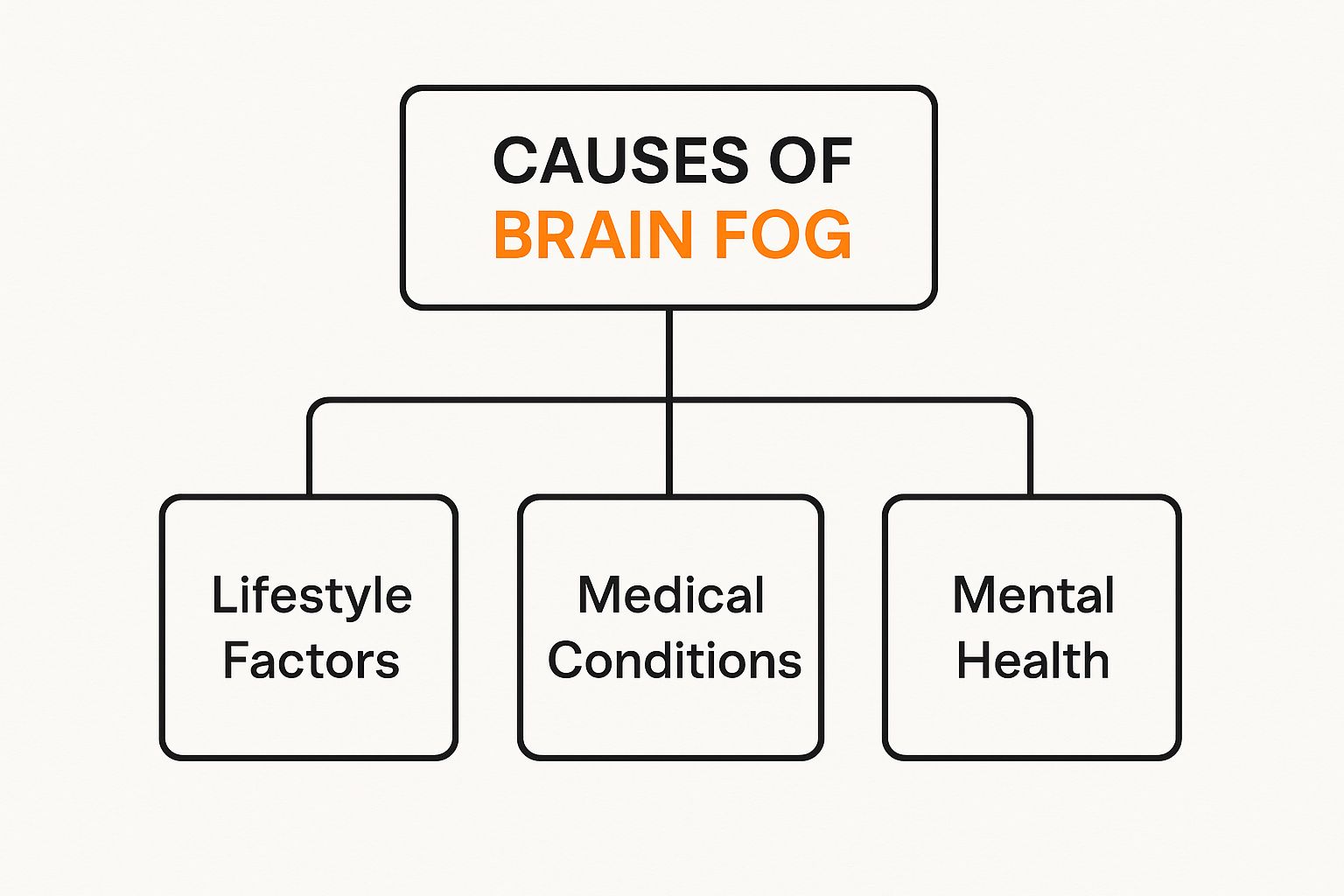What Causes Brain Fog and How to Fix It

Have you ever felt like your brain is running on dial-up in a high-speed world? That mental haze isn't just in your head—it’s a real, tangible signal that something is out of balance.
Think of your mental clarity as a car's windshield. On a good day, your view is sharp and unobstructed, letting you navigate your life with ease. Brain fog is like a thick layer of condensation that suddenly appears, obscuring your view and making it tough to process information, focus on the road ahead, or even remember your destination.
This cognitive slowdown can show up in several frustrating ways:
- Memory Lapses: Constantly forgetting names, appointments, or why you walked into a room.
- Poor Concentration: Struggling to follow a conversation or see a single task through to the end.
- Mental Fatigue: Feeling mentally drained and exhausted, even after a full night's sleep.
- Slowed Thinking: Taking longer than usual to process thoughts or find the right words.
The image below breaks down the primary sources of brain fog into three main categories, showing just how interconnected the problem can be.

As the diagram makes clear, the roots of this issue span everything from our daily habits to our internal health.
The Three Pillars of Brain Fog
To really get a handle on what causes brain fog, you have to look at these three key areas. Lifestyle choices like poor sleep or diet, underlying medical issues such as hormonal imbalances, and mental health struggles like chronic stress all play a huge role in creating that hazy feeling. Each one can act like a dimmer switch on your cognitive function, turning down your mental sharpness.
Brain fog is a symptom, not a diagnosis. It’s your body’s check-engine light, signaling that an underlying system—whether it's metabolic, neurological, or psychological—needs attention.
To give you a quick overview, this table summarizes the main areas that contribute to that feeling of mental sluggishness.
Key Contributors to Brain Fog at a Glance
| Category | Common Triggers | Typical Cognitive Impact |
|---|---|---|
| Lifestyle Factors | Poor sleep, nutrient deficiencies, dehydration, lack of exercise | Reduced focus, slowed thinking, poor short-term memory |
| Medical Conditions | Hormonal imbalances (thyroid, cortisol), chronic inflammation, autoimmune disorders | Persistent mental fatigue, difficulty concentrating, memory recall issues |
| Mental Health | Chronic stress, anxiety, depression, burnout | Overwhelm, inability to multitask, emotional exhaustion, forgetfulness |
This table is a starting point, but it shows how different parts of your life and health can directly affect your mental clarity.
Throughout this guide, we’ll dive deep into each of these pillars, giving you a clear roadmap to understanding your specific triggers. The experience of brain fog is real, and more importantly, it is often a solvable problem once you identify its roots. By learning about these factors, you can take the first step in clearing the haze for good. And for those looking for immediate strategies, discovering how to think clearer can offer some practical starting points.
How Your Daily Habits Can Cloud Your Thinking
While it's easy to jump to complex medical reasons, the real answer to "what causes brain fog?" is often hiding in plain sight: our daily routines. The choices we make from the moment we wake up have a direct and profound impact on our brain's ability to fire on all cylinders. These habits can either sharpen our focus or slowly, brick by brick, build a wall of mental haze.
Think of your brain as a high-performance engine. It needs the right fuel, regular maintenance, and the proper operating conditions to run smoothly. When you neglect those basic needs, the engine starts to sputter, misfire, and lose power. That’s the essence of lifestyle-induced brain fog.

Let’s break down four of the biggest lifestyle culprits that are notorious for clouding your thinking and get into the science of why they matter so much.
The Brain's Nightly Cleaning Crew
Sleep is so much more than just rest; it’s an active, essential maintenance cycle for your brain. While you’re asleep, a remarkable process called the glymphatic system kicks into high gear. This system acts like a microscopic cleaning crew, flushing out metabolic junk and toxins that build up between your brain cells all day long.
When you don’t get enough quality sleep, this cleaning process gets cut short. Imagine a city where the garbage trucks only run for half their scheduled shift—waste piles up, the streets get clogged, and everything grinds to a halt. That’s exactly what happens in your brain, leading to that familiar cognitive sluggishness, poor memory, and difficulty concentrating the next day.
Consistently getting less than 7-9 hours of sleep a night seriously impairs the glymphatic system's efficiency, leaving behind cellular debris that directly contributes to brain fog.
Dehydration and the Dry Brain
Your brain is about 75% water, so even a small drop in hydration can have a surprisingly big effect on its performance. When you're dehydrated, your blood volume decreases, which means less blood—and therefore less oxygen and fewer nutrients—can make it to your brain.
This drop in cerebral blood flow forces your brain to work much harder to achieve the same results, leading to feelings of fatigue and mental strain. It’s like trying to run a marathon in the desert without a water bottle. Your body has the ability, but it’s missing the critical resource it needs to perform at its best. Staying hydrated is one of the simplest and most effective ways to keep your thinking clear.
The Inflammatory Impact of Your Diet
The food you eat is literally the fuel your brain uses to create energy and build neurotransmitters, the chemical messengers that control your thoughts and mood. A diet packed with processed foods, refined sugars, and unhealthy fats can trigger a state of low-grade, chronic inflammation throughout your body—and that includes your brain.
This neuroinflammation disrupts the communication between brain cells, kind of like static on a phone line. It makes it harder for signals to travel efficiently, resulting in slower processing speed and muddled thoughts. On the flip side, a diet rich in whole foods gives your brain the high-quality building blocks it needs to thrive.
Brain-Boosting Foods vs. Fog-Inducing Foods
| Foods to Prioritize | Foods to Limit |
|---|---|
| Omega-3 Fatty Acids (e.g., salmon, walnuts) reduce inflammation. | Refined Sugars (e.g., soda, candy) cause energy spikes and crashes. |
| Antioxidants (e.g., berries, leafy greens) protect brain cells. | Processed Foods (e.g., packaged snacks) can promote inflammation. |
| Complex Carbohydrates (e.g., oats, quinoa) provide steady energy. | Trans Fats (e.g., fried foods) are harmful to brain cell structure. |
Making conscious food choices is a powerful step toward clearing away that mental haze for good.
Chronic Stress and the Cortisol Cascade
In small doses, stress can be a great motivator. But when stress becomes your constant companion, your body gets flooded with the stress hormone cortisol. Initially, cortisol helps sharpen your focus for a "fight or flight" response. Over time, however, chronically elevated levels become toxic to the brain.
Prolonged exposure to high cortisol can actually damage and shrink the hippocampus, a part of the brain that's critical for learning and memory. It also messes with the prefrontal cortex, which governs executive functions like decision-making and concentration. This constant state of high alert simply exhausts your mental resources, leaving you feeling drained, unfocused, and overwhelmed.
Effectively managing stress isn’t just good for your mood; it’s essential for your cognitive health. When stress consistently drains your vitality, exploring ways to improve energy levels naturally can provide a much-needed boost.
Uncovering the Medical Roots of Brain Fog
Sometimes, that persistent haze clouding your thoughts isn’t just the result of a busy week or a poor night's sleep. It can be your body's check engine light, signaling an underlying medical issue that needs attention. When the usual lifestyle fixes don't clear the air, it’s time to look deeper at what might be causing brain fog from a medical standpoint.
This kind of mental sluggishness is a common thread in a whole host of health conditions. It’s deeply frustrating, but understanding the potential medical roots is the first real step toward finding a solution that works. Let's dig into some of the most common health issues where brain fog is a key player.

Hormonal Shifts and Brain Chemistry
Your hormones are powerful chemical messengers that run everything from your mood to your metabolism. When they fall out of balance, your brain’s intricate communication network is often one of the first systems to feel the static. Think of hormones as the conductors of your body's orchestra; if one is out of tune, the whole performance suffers.
This is especially true for two key areas:
- Thyroid Imbalances: The thyroid gland in your neck produces hormones that act like the gas pedal for your body's energy use. If it becomes underactive (hypothyroidism), your entire system slows down—and that includes your brain's processing speed. This leads to classic brain fog symptoms like forgetfulness and mental fatigue.
- Menopause and Perimenopause: The decline in estrogen during this major life transition has a direct impact on the brain. Estrogen helps regulate crucial neurotransmitters like serotonin and dopamine, which are essential for mood and sharp thinking. As estrogen levels fluctuate and drop, many women experience significant brain fog. Recognizing the common signs of low estrogen can help you connect the dots.
Autoimmune Conditions and Inflammation
Autoimmune diseases happen when the body's immune system gets confused and starts attacking its own healthy tissues. This triggers widespread, chronic inflammation that can directly impact the central nervous system, leading to persistent and often debilitating brain fog. It’s like having constant friendly fire inside your body that disrupts your brain’s delicate operations.
Several autoimmune conditions are well-known for causing these cognitive symptoms:
- Multiple Sclerosis (MS): In MS, the immune system attacks the protective sheath covering nerve fibers, which messes up communication between the brain and the body. Brain fog, often called "cog fog" by patients, is one of the most common and frustrating symptoms.
- Lupus: This condition can cause inflammation all over the body, including the brain. Many people with lupus report problems with memory, confusion, and concentration, sometimes referred to as "lupus fog."
- Rheumatoid Arthritis (RA): While known for causing joint pain, the systemic inflammation from RA can also spill over and affect cognitive function, leading to brain fog and mental exhaustion.
Brain fog in autoimmune diseases isn't "all in your head." It's a real neurological symptom caused by inflammation interfering with the brain's ability to process information efficiently.
Chronic Illnesses and Neurological Disruption
Beyond hormonal and autoimmune issues, several other chronic conditions are notorious for causing brain fog. These illnesses can disrupt the brain’s energy supply, interfere with nerve signaling, or create a physiological environment that just makes clear thinking difficult.
One of the most prominent examples is fibromyalgia, a condition defined by widespread musculoskeletal pain. Researchers believe that in fibromyalgia, the brain and spinal cord process pain signals differently, basically turning up the volume on painful sensations. This constant state of high alert, combined with poor sleep, often results in severe brain fog, which patients sometimes call "fibro fog." They struggle with finding the right words, short-term memory, and multitasking.
Another major cause is chronic fatigue syndrome (CFS), also known as myalgic encephalomyelitis (ME/CFS). Extreme, unrelenting fatigue that doesn't get better with rest is the hallmark of this condition, and significant brain fog is a core diagnostic symptom.
Post-Viral Syndromes and Long COVID
We are now more aware than ever that viral infections can have long-lasting effects on the brain. The body's intense immune response to a virus can trigger neuroinflammation that sticks around long after the initial infection is gone, leading to what’s known as a post-viral syndrome.
The most well-documented example of this is long COVID. Brain fog has been strongly linked to this condition, with numerous studies showing cognitive symptoms like impaired concentration and memory issues in a huge portion of patients months after their initial infection. One large study of over 273,000 people found that between 8% and 26% experienced such cognitive symptoms within 3 to 6 months post-infection. For those affected, the mental haze can be just as disruptive as the physical symptoms. You can explore more about these findings and learn about the impact of long COVID on brain health.
If your brain fog is persistent and comes with other physical symptoms, it’s crucial to consider these medical possibilities. Talking to a healthcare provider can help you connect the dots between your physical health and your mental sharpness, leading to a proper diagnosis and an effective treatment plan.
Your Mind, Your Mood, and Your Mental Clarity
Your emotional state isn't just a collection of feelings—it’s deeply wired into your brain's physical hardware. That’s why mental health conditions like depression and anxiety aren’t just in your head; they trigger real, physiological changes that can directly cause that frustrating brain fog. When your mind is under constant strain, your brain’s performance almost always follows.
Think of your brain's processing power like the Wi-Fi in your house. When everything’s running smoothly, you can stream, download, and browse without a hitch. But when a condition like anxiety kicks in, it’s like someone in the house starts a massive, bandwidth-hogging download. Suddenly, everything else slows to a crawl, and pages take forever to load. Your mental connection feels weak and unreliable.
How Depression Dims Your Cognitive Lights
Depression is far more than just feeling sad. It’s a complex condition that alters your brain chemistry and even its physical structure, directly affecting your ability to think. Key neurotransmitters like serotonin and dopamine—which are essential for mood, motivation, and focus—often go haywire.
This chemical imbalance scrambles the communication lines between different parts of your brain. It particularly impacts the prefrontal cortex, your brain's CEO, which is in charge of planning, making decisions, and staying on task. As a result, even simple chores can feel like climbing a mountain, and your thinking becomes sluggish and muddled.
A tell-tale sign of depression-related brain fog is a persistent loss of mental sharpness and drive that doesn't get better with a good night's sleep. It's a cognitive drain directly tied to the underlying mood disorder.
When Anxiety Puts Your Brain on Red Alert
Chronic anxiety forces your brain into a constant state of "fight or flight." Your system is flooded with stress hormones like adrenaline and cortisol, keeping your nervous system perpetually braced for a threat that never comes. This response is great for escaping actual danger, but it's completely exhausting when it becomes your day-to-day reality.
This sustained vigilance hijacks an enormous amount of mental energy, diverting it away from higher-level thinking. Your brain's resources are monopolized by scanning for danger, leaving very little leftover for complex problem-solving, memory recall, or focused work. It’s like trying to write a detailed report while a fire alarm is blaring right next to your ear—nearly impossible.
The connection between mental health struggles and brain fog is becoming clearer, especially with conditions like long COVID. A major analysis of 17 studies, involving over 41,000 patients, found that the combined prevalence of mental health disorders and brain fog was a staggering 20.4% among those with long COVID. This really underscores how psychological distress and cognitive issues often go hand-in-hand. You can read the full research about these intersecting conditions to learn more.
Burnout Is More Than Just Feeling Stressed
While we often use the words interchangeably, burnout isn’t just stress. It's a distinct state of emotional, physical, and mental exhaustion that comes from being under prolonged, excessive stress. It’s defined by three core dimensions that are a perfect recipe for severe brain fog:
- Emotional Exhaustion: A deep-seated feeling of being completely drained and having nothing left to give.
- Depersonalization or Cynicism: Feeling detached, cynical, and negative about your job or responsibilities.
- Reduced Personal Accomplishment: A nagging sense of incompetence and feeling like you’re not achieving anything.
This toxic trio directly sabotages your ability to think clearly. Emotional exhaustion drains the mental battery you need for focus, while cynicism makes it impossible to engage with tasks in a meaningful way. Your brain is simply too depleted to function at its best, leading to a profound and persistent mental haze. Taking care of your mental wellness isn't just about feeling happier; it’s a non-negotiable requirement for thinking clearly and sharply.
Overlooked Nutritional and Environmental Triggers
Beyond the usual suspects like stress and poor sleep, some of the most powerful triggers for brain fog are hiding in plain sight—in the food you eat and the environment you live in. These factors often fly under the radar but can seriously drag down your cognitive function.
Think of it this way: your brain is a high-performance engine. What you put into your body is the fuel, and your surroundings are the road conditions. If you're running on low-quality fuel or driving through constant sludge, that engine is going to sputter. This is exactly what happens when nutritional gaps or environmental toxins cloud your thinking.
The Brain on Empty: Key Nutrient Deficiencies
Your brain is incredibly demanding, guzzling down about 20% of your body's total energy and nutrients. When specific building blocks run low, its performance tanks. Even if you think you're eating pretty well, a few common deficiencies are notorious culprits behind that feeling of persistent mental haze.
Two of the most critical nutrients for a sharp mind are Vitamin B12 and iron.
- Vitamin B12: This vitamin is essential for maintaining the myelin sheath, which is the protective insulation around your nerve fibers. When B12 is low, that insulation starts to wear thin, slowing down the communication between brain cells. It's like having frayed wiring in your house—the electrical signals get weak and unreliable, leading to slow processing and a spotty memory.
- Iron: Iron is a core component of hemoglobin, the protein in your red blood cells that ferries oxygen everywhere. If your iron levels are low (anemia), your brain is literally being starved of the oxygen it needs to function. This oxygen deficit is a direct route to mental fatigue, poor concentration, and that all-too-familiar feeling of being completely drained.
A deficiency in key nutrients doesn't just make you tired; it fundamentally impairs the biological machinery your brain relies on for clear thought. Identifying and correcting these gaps can feel like turning the lights back on in a dim room.
When Food Becomes a Foe
Sometimes, the problem isn’t about what you're missing, but what you’re putting in. Food sensitivities and intolerances can spark an inflammatory response that starts in your gut but rarely stays there. Thanks to a powerful connection called the gut-brain axis, inflammation in your digestive system sends disruptive signals straight to your head.
When you eat something your body can’t handle, it can trigger the release of inflammatory molecules called cytokines. These molecules can travel through your bloodstream, cross the blood-brain barrier, and cause neuroinflammation. This low-grade inflammation in the brain is a primary driver of brain fog, making you feel mentally sluggish and unfocused after certain meals. Common culprits include gluten, dairy, and artificial additives.
Your Surroundings and Your Sanity
It’s not just what’s inside you that matters; your external environment plays a huge role, too. Often, the very air you breathe or the products you use can be sources of cognitive disruption. Think of it as a form of low-level, continuous static that wears down your mental processing power over time.
This interference can come from a few places:
- Poor Indoor Air Quality: Buildings with bad ventilation can trap pollutants like mold, dust, and volatile organic compounds (VOCs) from furniture and cleaning supplies. Breathing these in can lead to inflammation and reduced oxygen flow to the brain, directly making it harder to concentrate.
- Environmental Toxins: Exposure to heavy metals (like lead or mercury) or pesticides can be neurotoxic. These substances can build up in your body and mess with neurotransmitter function or even damage brain cells, leading to long-term cognitive issues that feel like severe brain fog.
Tackling these hidden triggers is a critical step in clearing your head for good. By making sure your brain is well-fed and your environment is clean, you give yourself the best possible foundation for sharp, clear, and focused thinking.
When You Should See a Doctor for Brain Fog
Most of the time, a bout of brain fog is just a temporary nuisance—the annoying result of a poor night's sleep or a stressful week. It usually clears up on its own with a few simple lifestyle tweaks. But it's crucial to recognize when that mental haze is more than just a passing cloud and might be signaling a more serious, underlying issue. Knowing when to call a professional is the first step toward getting real clarity.
Think of it like the difference between a single flickering lightbulb and a full-on power outage. A flicker might just be a loose bulb you can fix yourself. A total blackout, on the other hand, points to a problem with the main wiring. In the same way, while temporary brain fog is manageable, persistent or severe cognitive changes absolutely warrant a closer look from a healthcare professional.

Key Red Flags to Watch For
While occasional forgetfulness is a normal part of being human, certain symptoms should be your cue to schedule a doctor's appointment. These "red flags" can indicate that your brain fog isn't just a lifestyle issue but a symptom of a medical condition that needs a proper diagnosis and treatment.
Pay close attention if your brain fog is:
- Sudden and Severe: If cognitive difficulties appear abruptly and are significantly impacting your ability to function day-to-day.
- Progressively Worsening: Your mental clarity isn't just foggy but seems to be getting worse over time, not better.
- Accompanied by Neurological Symptoms: You're also experiencing other concerning signs like numbness, tingling, severe headaches, dizziness, or changes in your vision.
- Paired with Other Physical Symptoms: It shows up alongside unexplained fatigue, joint pain, fever, or sudden weight changes.
It's all too easy to dismiss persistent memory issues as a normal part of aging, especially in older adults. But treatable conditions like Lyme disease have been misdiagnosed as Alzheimer's, which really highlights how critical a thorough medical evaluation is for any significant cognitive decline.
Preparing for Your Doctor's Visit
To make your appointment as productive as possible, you need to go in prepared. Your doctor will need specific details to piece together the full picture of what you're experiencing. Before you go, take some time to track your symptoms and gather the relevant information.
Consider bringing notes on the following:
- Symptom Timeline: When did the brain fog start? How has it changed since then?
- Daily Patterns: Is it worse at certain times of the day or after specific activities or meals?
- Lifestyle Factors: Make a note of any recent changes in your diet, sleep habits, stress levels, or any new medications or supplements.
- Associated Symptoms: List any other physical or emotional changes you've noticed, no matter how small or unrelated they might seem.
This information is invaluable, helping your doctor narrow down the potential causes of your brain fog. From there, they might recommend blood tests, imaging scans, or other diagnostic tools to rule out things like hormonal imbalances, nutrient deficiencies, or other medical conditions. Advocating for your own health starts with being prepared—it ensures you get the answers and the care you need without delay.
Your Questions Answered
When you're dealing with that frustrating, fuzzy feeling, a lot of questions come up. Let's clear the air and tackle some of the most common ones so you can find a path back to mental clarity.
Is Brain Fog a Permanent Condition?
For most people, the answer is a reassuring no. Brain fog is typically temporary and lifts once you address what’s causing it. If a terrible night’s sleep is the culprit, for example, getting proper rest will usually clear it right up. It’s very rarely a permanent state without any hope of improvement.
However, when brain fog is tied to a chronic health issue like an autoimmune disease or long COVID, it can stick around or come and go. In those cases, the focus shifts to managing the root illness to keep the cognitive symptoms at bay as much as possible.
What Are the First Steps to Clear Brain Fog?
Start with the fundamentals. The biggest wins often come from nailing down the basics of a healthy lifestyle, and these habits can sharpen your focus more than you might think.
- Prioritize Sleep: Aim for a solid 7-9 hours of quality sleep each night. Consistency is key.
- Stay Hydrated: Your brain needs water. Sipping it throughout the day supports healthy blood flow and function.
- Eat Whole Foods: A diet rich in anti-inflammatory, nutrient-dense foods is like premium fuel for your mind.
- Get Active: Regular physical activity gets your blood pumping and is a fantastic way to bust stress.
Give these a real shot for a few weeks. If you’re consistent and still not feeling any sharper, that’s a good signal it’s time to talk to a healthcare professional.
“Supplements can be very effective, but only if they are correcting a specific deficiency… Taking them without a diagnosed need is often ineffective. Always speak with your doctor before starting supplements.”
Should I Use Supplements to Fix Brain Fog?
Supplements can be a game-changer, but only if they’re targeting a specific deficiency that’s been properly diagnosed. Key nutrients like Vitamin B12, iron, and omega-3s are vital for brain health, and supplementing can make a world of difference if your levels are low.
But here’s the critical part: you need to get tested first. Taking supplements you don’t need is often just a waste of money. Your doctor can run simple blood tests to pinpoint any nutritional gaps and recommend the right supplement and dosage for your body’s unique needs.
At Elite Bioscience, we provide access to therapies that support cognitive function and overall well-being. Explore our physician-guided treatments designed to help you regain your mental edge and feel your best by visiting https://elitebioscience.co.
QUICK SEARCH
Make an account today to start your journey towards a better and healthier lifestyle.



